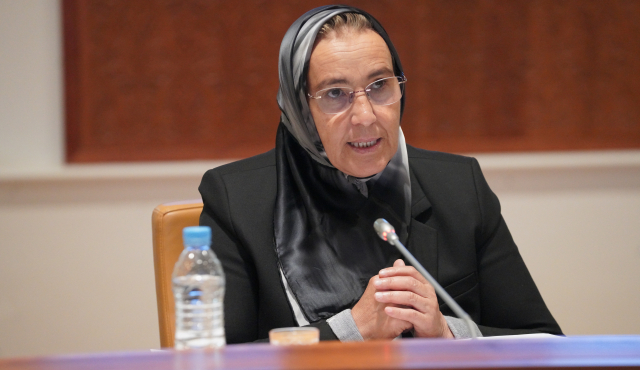Deputy Speaker of the House of Representatives, Rep. Khadija Ezzoumi, Takes Part in the Dialogue of Arab Parliaments on the Sixth Regional Review of the Work Program of the ICPD
<p style="text-align: justify;">Deputy Speaker of the House of Representatives, Rep. Khadija Ezzoumi, took part on Thursday, May 11, 2023, via videoconference, in the proceedings of the Dialogue of Arab Parliaments on the Sixth Regional Review of the Work Program of the International Conference on Population and Development (ICPD), organized by the UN Economic and Social Committee for Western Asia (ESCWA) in cooperation with the UN Population Fund and the League of Arab States. </p>
<p style="text-align: justify;">In her intervention on occasion, Rep. Ezzoumi noted the centrality of the questions of population and development in the 2030 Sustainable Development Plan, which imposes the imperative of pursuing action and consolidating gains, in order to implement the high Royal directives, apply the recommendations of the New Development Model, accomplish the execution of the Government program, instill the bases of the social State, and implement the reform and development projects. </p>
<p style="text-align: justify;">In the same regard, the Deputy Speaker of the House added that the questions of women, youth, health, environment, education, migration, and other ones are of utmost legislative priority given their importance in the construction of the political, economic, and cultural future of our societies that aspire to provide the conditions of a decent life for their children. "Therefore, we had to lead a giant leap in our way of thinking about the question of population and development by focusing on the rights of individuals, quality, dignity, and well-being in their lives, and also by linking population and human rights to economic growth and sustainable development, and address these questions more comprehensively and cohesively."</p>
<p style="text-align: justify;">Moreover, Rep. Ezzoumi noted that the legal framework adopted by the Kingdom of Morocco in the area of population and development encloses several laws and regulations that aim to ameliorate the quality of the life of citizens and consolidate sustainable development in the country, starting from the Constitution, which is the supreme law of the State. The latter includes articles related to development and population, mainly Article 31, which stipulates that the State shall work on the achievement of balanced and sustainable development, uplift the level of the economic and social life of citizens, ameliorate the infrastructure and general service, achieve development in rural areas and marginalized ones. In the same vein, the Deputy Speaker of the House also recalled the Framework Law on Human Development, the Family Code, and the Framework Law on Cities. </p>
<p style="text-align: justify;">On the same occasion, the Deputy Speaker shed light on the Kingdom’s strategy for population and development, which is based on the development programs and policies aimed at ameliorating the quality of citizens' life and consolidating sustainable development in the Kingdom through a focus on several social and economic aspects of the population. </p>
<p style="text-align: justify;">The strategy includes several axes, including the enhancement of reproductive health by ameliorating healthcare for women and girls and providing them with the necessary health services, ameliorating the quality of health education and culture in order to reinforce the role of women in society and empower them economically and socially, focusing on the economic and social dimensions of the population by elaborating projects and programs that strengthen the ability of low-income families and categories to ameliorate their living conditions, the National Human Development Initiative, which is a development project launched officially following the Royal speech of May 18, 2005. The Initiative aims at ameliorating the economic and social conditions of vulnerable categories, putting the Moroccan citizen at the heart of the development challenge by adopting an organizational methodology based on inclusion and participation, ameliorating the management of migration and neutralization, enhancing local governance, encouraging social participation, and enabling local societies to benefit from the available development opportunities. </p>
<p style="text-align: justify;">The Deputy Speaker reiterated the call to join the efforts of parliamentarians to reinforce the application of the international resolutions in the fields of population and sustainable development, perform their roles in advancing the policies of population and development in our countries at the level of legislation by reviewing laws and adapting them to development goals, and at the level of control by monitoring the application by citizens of their missions regarding the relevant sectors and the degree of efficiency of the assigned resources in the budgets and pressuring governments to provide the necessary information. </p>
<p style="text-align: justify;">The parliamentarians taking part in the meeting agreed on the imperative of broadening the scope of cooperation to exchange information and analyze them according to the latest means, creating a preemptive system in the cases of crises, and adapting the public policies, particularly in the areas of budgeting and objectives with the reality that imposes several challenges. </p>
<p style="text-align: justify;">It should be noted that the meeting is part of the decennial review of the Cairo Declaration of 2013, as part of the cycle review and evaluation of the work program of the International Conference on Population and Development, 30 years after its adoption in 1994.</p>
<p style="text-align: justify;"> </p>






